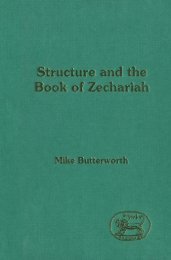Appendix CASE ONE - Collection Point® | The Total Digital Asset ...
Appendix CASE ONE - Collection Point® | The Total Digital Asset ...
Appendix CASE ONE - Collection Point® | The Total Digital Asset ...
Create successful ePaper yourself
Turn your PDF publications into a flip-book with our unique Google optimized e-Paper software.
<strong>The</strong> Early Development of the Laws of the Anglo-Scottish Marches 31<br />
which would be fought on the Scottish side of the Sol way. Once proceedings<br />
had got this far, the plaintiff could claim damages at will, and the defendant<br />
must find sureties for their payment, whatever the sum named, otherwise, as<br />
Henry Scot put it, he 'must undergo judgement as though legally convicted'.<br />
If he did find sureties and was then defeated in the duel, however, he would<br />
only have to pay two thirds of the sum demanded. Cases from Cumberland<br />
and Northumberland in the 1290s point to similar proceedings in cases of<br />
homicide, 11 the damages claimed here being doubtless the manbote - wergeld<br />
- mentioned in the 1249 code. If this looks like another archaic survival, the<br />
same can surely be said of the insistence on the defendant's finding sureties<br />
and the consequence of his being unable to do so, strongly reminiscent as this<br />
is of clauses in the laws of Cnut (possibly mediated through clause 12 of the<br />
Assize of Clarendon) providing for the arrest and imprisonment, even for the<br />
outright slaughter, followed by burial in unconsecrated ground, of men with<br />
no sureties, 12 their absence being seen as a clear sign of unworthiness. But<br />
although such considerations of antiquity may be of interest in the twentieth<br />
century, they meant little in the thirteenth. Edward I was in Cumberland in<br />
1280 and could have investigated the matter for himself if he had wanted to.<br />
Whether or not he did so, what he learned from the inquest was so little to his<br />
liking that in 1280 or 1281 he abolished the procedure described. Inevitably<br />
the Scots followed suit. 13<br />
At the end of a decade which produced several reports of groups of criminals<br />
crossing the border from Scotland into England, 14 such a procedure was not<br />
likely to be much help in keeping the peace in the Marches anyway. No doubt<br />
it seemed better that the existing processes of the common law should be<br />
adapted to the needs of the region. Hence the case recorded at a Newcastle<br />
gaol delivery in 1308, when, after a thief had been convicted of stealing cows<br />
at the suit of their owner - who was no less a figure than the son of the earl<br />
of Dunbar - the latter demanded the return of his cattle 'in accordance with<br />
the custom of the march between England and Scotland in use until now'. 15<br />
<strong>The</strong> men of Northumberland, questioned about this by the justices, upheld<br />
the claim, declaring that goods stolen in Scotland and carried into England,<br />
or vice-versa, should indeed be returned to their owner if the thief had been<br />
convicted at the former's suit 'before whatever justices', in other words, in a<br />
properly constituted court. <strong>The</strong>re is not likely to have been any shortage of<br />
such courts, since in the English borders there were numerous liberties with<br />
the franchise of gallows to supplement periodic visitations by gaol delivery<br />
justices, just as in Scotland the justiciars' courts were reinforced by those of<br />
11 JUST/1/137, m 13; JUST/1/652, m 36d.<br />
12 English Historical Documents, 1, c. 500-1042, D. Whitelock, ed. (1955), 424.<br />
13 What appears to be a simplified procedure at Berwick was recorded in 1293, Documents Illustrative<br />
of the History of Scotland, J. Stevenson, ed. (Edinburgh, 1870), i, 392-93.<br />
14 SCI/7, no.84; SCI/13, no. 156; SC8/277, no. 13807.<br />
15 JUST/3/53/2, m 4/ld.






